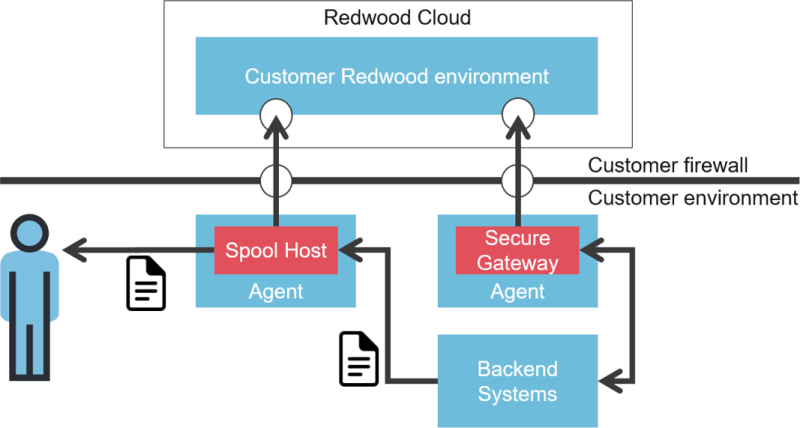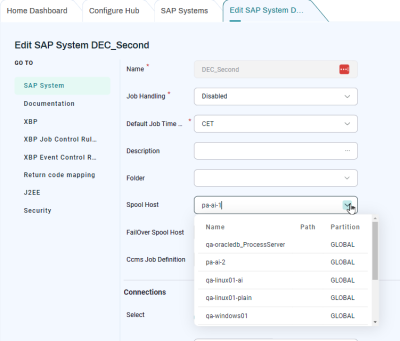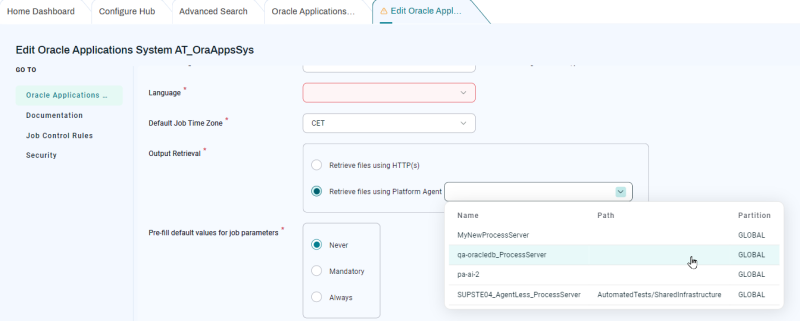Configuring the Spool Host
Introduction
A Spool Host is a special type of Platform Agent that retrieves and stores SAP and/or Oracle EBS output. You can use a Spool Host to view and analyze ERP spool data from the cloud-based console without the data itself leaving your site.
Spool Host Overview
RunMyJobs manages processes in ERP systems by setting up a dedicated connection with the Secure Gateway. This is the only connection to the cloud you need to run SAP processes on all SAP systems, Peoplesoft, or EBS Concurrent Programs on all EBS systems. During configuration of these ERP Job Servers you must select a Spool Host. The Spool Host retrieves spool data and makes it available via the RunMyJobs user interface without copying that spool datato the Redwood Cloud.

Configuring the Spool Host
The Spool Host requires installation of at least one Platform Agent.
Note: One Platform Agent can serve both as a Secure Gateway and a Spool Host, but Redwood does not recommend this.
Spool files can be large, so the Spool Host must have sufficient disk space. For SAP and PeopleSoft, it must also be on the same network. And for EBS, it must be on the Concurrent Manager(s) where the logs are.
When you add a new SAP System to RunMyJobs, you must define a Spool Host. The Spool Host dropdown list displays all available Platform Agents.

You can optionally specify a FailOver Spool Host. If the primary Spool Host becomes unavailable, the failover Spool Host takes over. When the primary Spool Host comes back up, spool files will resume being stored on that computer.
Installing SAP RFC SDK Libraries
Beginning with RunMyJobs 9.2.6.2, Spool Hosts require manual installation of SAP RFC SDK libraries. After you create the Job Server and install the Platform Agent, do this:
- Download the SAP NW RFC SDK (see SAP Note 2573790).
- Windows server: 32-bit NW RFC SDK and VisualC++ 2015 Redistributable Package
- Linux server: Same platform SDK as Platform Agent.
- Unzip and copy the
nwrfcsdk/libfiles to the Platform Agent using the path<INSTALL_PATH>/saplibs. - Select the Spool Host.
Note: The <INSTALL_PATH>/saplibs directory is prepended to the library search path.
Troubleshooting
If the RFC libraries are not found, you will see errors like the following (from the joblog.log file):
com.redwood.scheduler.jobfile.exceptions.JobFileBackendsExhaustedException: JCS-108002: The specified process file ... cannot be retrieved.
You will also see an Operator Message like the following:
Unable to retrieve output: com.redwood.scheduler.api.exception.PerformRFCActionRemoteException: JCS-104017: RFC action failed due to exception: 127
java.lang.UnsupportedOperationException: PerformRFCActionResult failed with status E returncode 127
Agent jrfc action failed: jrfc: error while loading shared libraries: libsapnwrfc.so: cannot open shared object file: No such file or directory
Note: The jrfc binary has been removed from AIX Power.
As an alternative, you can use Java with Java Connector (SAP JCo) libraries from SAP AG to allow a Platform Agent to act as an SAP spool host.
Instructions for retrieval of SAP output without jrfc:
- The Platform Agent must already be installed on the server (and executing OS jobs successfully)
- Java 17 must be installed and working on the server.
- Check that the Job Server connected to the Platform Agent can execute Jobs of JobDefinitionType Java:
- Make sure the Job Server is set up with the JavaJob Definition Type.
- Create a Job Definition of type Java with the following source:
{ jcsOut.println("Hello World"); } - Execute the Job Definition on the Job Server and verify that it executes successfully.
- Get the SAP Java Connector 3.1.2 or later from SAP.
- Deploy JCo in the
<INSTALL_PATH>/jcoon the server. The files required arelibsapjco3.soandsapjco3.jar- It may be necessary to add
libsapjco3.soto theLIBPATHenvironment variable. Note that on AIX,LD_LIBRARY_PATHequivalent isLIBPATH. For more information, see Aix LIBPATH.
- It may be necessary to add
- Create or update the registry entry
/configuration/jcs/sap/output/retrieveoutputviaagentwith valuetrue. - Edit the Job Server and add a Job Server Parameter named
EnvironmentVariableswith the valueNATIVEJAVA_CLASSPATH=<path>/sapjco3.jar. - Update the SAP System definition(s) with the AIX Job Server as Spool Host (or failover Spool Host).
- Restart the SAP Job Server(s) and AIX Job Server.
- Verify that the Spool Host is working.
- Submit an SAP job (for example, via the Job Definition SAP_AbapRunJob) and verify in the Monitor screen that the SAP_AbapRun Job has a child named SAP_RfcAgentRetrieveOutput, and that both executed successfully.
- Verify that
step1_spool1.txtis on AIX Power server. To do so, click the Job in the Monitor screen, then in the tab that opens, click again on<jobid> step1_spool1.txtThe file name should be similar tordfs://<aix server>:<port>/readFile?.....
Oracle EBS-Specific Information
Because Oracle EBS stores output on the EBS server itself, you must install the Platform Agent that acts as Spool Host on this server.

By default, Platform Agents serve files only from the directory tree under their own <INSTALL_PATH>. To serve Oracle Applications output files, the Platform Agent must be configured to serve files from the Oracle Applications out and log directories.
Create a file named server_root in directory <INSTALL_PATH>/net/instance/<instance name> and put the Oracle Applications output file base path in it (for example /ebslogs/conc) or both full paths (separate lines or space separated, for example /ebslogs/conc/out /ebslogs/conc/log).
Note: When you set or change server_root, you must restart the Platform Agent service/daemon and the Job Server in the central server for the change to take effect.